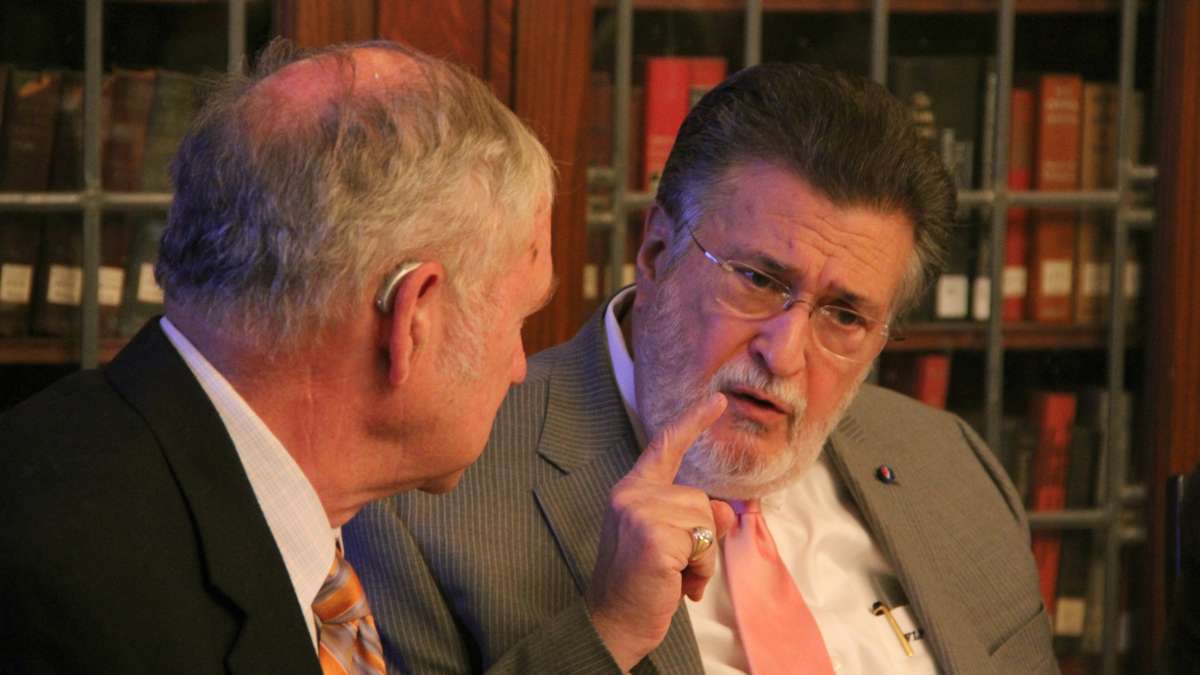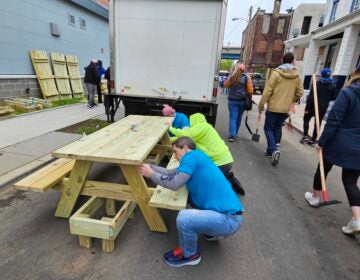Cold case investigators behind Philly’s Vidocq Society are in high demand
ListenOnce a month, for the last 25 years, criminal investigators and forensics experts have been meeting for lunch behind closed doors in Philadelphia to discuss some of the nation’s most heinous crimes.
But what might appear a shadowy cabal to the casual viewer is actually a volunteer collection of crimefighters donating their time and expertise to help smaller police departments investigate unsolved crimes.
It’s called the Vidocq Society.
‘We just give our opinion’
For decades, police in Phoenix couldn’t figure out who stabbed two women and left their bodies near the Arizona Canal in the early 1990s.
Running out of leads, they eventually hit a wall in the investigation.
So last year, two Phoenix investigators flew to Philadelphia to seek out the expert advice of the Vidocq Society’s current and retired criminal investigators.
The two investigators left with one strong kernel of advice from Vidocq members — they had probably already come across the killer in the course of their investigation.
Not long after, Phoenix police arrested Bryan Patrick Miller, who confessed to the stabbings.
“Our purpose is to act as a catalyst between law enforcement investigators, prosecutors, victims’ families, and the press … to help solve some of these cold cases,” said William Fleisher, one of the founders of the Vidocq Society. “We just give our opinion.”
Fleisher, a private investigator, said the group was born while he had lunch in Rittenhouse Square with a good friend and an acquaintance. All three had backgrounds in criminal investigation and talked for hours about their current cases.
“I’m saying, ‘Wow that was great. This has been very intellectually stimulating. We ought to do this on a regular basis,'” Fleisher said. “They said, ‘Aw, great idea, let’s do it.’ I said, ‘You think this is gonna be lunch. I’m going to do it.'”
So Fleischer sent out lunch invitations for the group’s first meeting to about 25 experienced criminal investigators and forensics experts.
At first they wanted to try to solve famous cold cases, such as the Lindbergh baby kidnapping or the Jack the Ripper killings, for the mental exercise. But after one member spoke to parents of children who’d been murdered, the group shifted its focus toward more recent unsolved cases, hoping to have a chance to catch living perpetrators.
They called themselves the Vidocq Society, after an early 19th century criminal-turned-detective.
“Eugene Francois Vidocq is considered the world’s first investigator,” Fleisher said.
How it works
The Vidocq Society meets once a month and hears one case per meeting. Small- and medium-sized police departments apply to be allowed to present to the group. A cold case brought before the Vidocq Society should have at least a body, a crime scene, and some physical evidence.
In May, it was a triple homicide from the late 1990s that also took place in Arizona, but this happened at a desolate campsite in a rural part of the state.
“Now this case — we know who the victims are; we just don’t know who killed them or why they killed them. So it’s a big puzzle,” said presenter Chuck Jones, a former FBI agent and current volunteer cold case investigator with the Coconino County sheriff’s office in Arizona.
“We’re hoping all the experience that’s in this room can give us some direction on how to move forward and maybe get something done,” Jones said.
His audience at the upscale Union League in Center City Philadelphia included lawyers, retired special agents, DNA experts, a profiler, a polygraph examiner and others.
After a quick lunch, Jones and his partner, Joe Sumner, start in on their PowerPoint presentation. They talk through each element of the case in extreme detail — from Coconino County geography, to crime scene evidence, to autopsies of the three victims.
Jones also highlights the parts of the case that are stumping investigators. For example, more bullet holes were discovered at the crime scene than shell casings found on the ground.
“Does that mean they were never on the ground? They were in a revolver?” Jones said. “That’s what we had this lunch for. I want everybody’s opinion on that.”
Over the clinking of plates and glasses, Vidocq Society members chimed in with questions about the case, including one man who asked whether any of the victims had recently come into any money.
“Was that known to an assailant? Was there somebody — a nephew, a son, or somebody — who needed money for a drug habit?”
When the presentation ended two hours later, Vidocq Society members filed to the front of the room to give Jones and Sumner their two cents. Most members will write down their recommendations and mail them to the investigators later.
Although the Vidocq Society doesn’t keep statistics, the group estimates it’s heard about 200 different cases.
It’s a lot less Sherlock Holmes than you might expect, but members say the pursuit of justice is the same.
“There are a lot of letters that come through requesting we get involved, most of them from family members,” said Vidocq Society chairman Benjamin Redmond, former inspector general for Philadelphia.
“And if you can do something that can assist people like these two very trained, experienced investigators in solving that case, I think that’s what I get out of it.”
WHYY is your source for fact-based, in-depth journalism and information. As a nonprofit organization, we rely on financial support from readers like you. Please give today.












